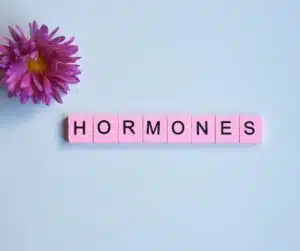Due to the complexity of the condition, there are a lot of misconceptions and myths surrounding PCOS and weight loss. One of the many symptoms of PCOS is weight gain, which can be frustrating for any woman trying to shed those extra pounds. And if you’re anything like me, you’ve tried it all – Weight Watchers, Keto, Intermittent Fasting, Supplements… . So, let’s discuss the top 5 misconceptions about PCOS and weight loss and get the facts straight about some of these things.
Myth: Eating less will lead to more weight loss with PCOS
One of the most common misconceptions regarding weight loss and PCOS is that eating fewer calories will automatically result in weight loss. Unfortunately, this approach may lead to weight gain and other health problems.
You see, with PCOS, insulin resistance is a common issue (1), which means that the body struggles to convert glucose into energy. This results in high levels of insulin in the body, which causes weight gain.

So, more than just focusing on calories, its important to focus on the quality of the food that you are consuming. Eating fewer processed foods and more nutrient-dense, whole foods can help reduce insulin levels in your body, which will help you in your weight loss journey.
Having said that, research has also shown that women with PCOS tend to need fewer calories than women without PCOS. So, don’t through calories out altogether. Eating a well balanced diet that focuses on managing insulin resistance, with lowering your calories slightly, can be an effective approach.
Myth: Weight loss with PCOS requires a low-carb diet
Another common misconception is that weight loss with PCOS requires following a strict low carb diet. While eating fewer carbs may help in some cases, this isn’t the case for everyone. Here are some reasons as to why a low carb diet may not be right for you and your PCOS:
1. Carbs provide energy
Carbohydrates are the primary source of energy for our bodies. When you consume a low-carb diet, you deprive your body of the energy it needs to function correctly. When energy levels drop, your metabolism slows down, and the body starts storing fat, leading to weight gain. The body needs a balance of all the macronutrients, including carbs, to perform its functions correctly.
2. Low-Carb diets are not sustainable
Low-carb diets may help you lose weight initially, but they’re not sustainable in the long run. When you severely restrict any food group, it’s only a matter of time before you start craving. And as soon as you reintroduce carbs into your diet, you’re likely to gain all the weight back, if not more. Weight loss is not a short-term goal but a long-term lifestyle change that you need to practice for years to maintain your health.
3. You need carbs for hormone regulation

4. Focus on complex carbs
When we talk about incorporating carbs into the diet, we do not mean excessive consumption of sugar-laden or refined carbs. Instead, you should focus on consuming complex carbs, including whole grains, legumes, fruits, and vegetables, that contain fiber, vitamins, minerals, and other essential nutrients. Complex carbs provide sustained energy levels, satiety, and help in regulating blood sugar levels, leading to improved PCOS symptoms and weight loss.
5. It’s all about balance
A balanced diet that includes all nutrients in moderation is the key to a healthy PCOS weight loss journey. A healthy diet should include a balance of complex carbs, lean proteins, healthy fats, fruits, vegetables, and fiber. In addition to a healthy diet, you should also focus on regular exercise, getting sufficient sleep, managing stress, and staying hydrated to maintain a healthy weight and improve PCOS symptoms.
Myth: Cardio is the best form of exercise for weight loss.

Building lean muscle mass through weight training can help boost metabolism and burn calories. Also, remember that insulin receptor cells are in the muscles themselves so the more lean muscle you have, the more insulin receptors you have available. This can help reduce insulin resistance and make it easier to lose weight.
Additionally, strength training helps boost energy levels, improve body composition, increase bone density, reduce risk of injury and keeps your metabolism revved up.
So, if you’ve been spending hours in the gym doing cardio but not seeing results, add in some strength training exercises. This way you can maximize your workouts and get the full benefits of exercise for weight loss (3).
Myth: All women with PCOS Struggle with Weight Gain.
Weight gain and PCOS are often linked because the disorder can affect insulin resistance, leading to higher levels of blood sugar and fat storage. However, not all women with PCOS struggle with weight gain. A study in the Journal of Women’s Health found that only about 30-50% of women with PCOS are overweight or obese (4). That means a significant portion of women with PCOS can, in fact, maintain a healthy weight without significant struggle.
Moreover, the type of PCOS a woman has can also affect whether or not she will experience weight gain. PCOS is generally categorized into four types based on the symptoms present and their underlying causes. Women with phenotype A PCOS, which is characterized by high levels of male hormones called androgens, are more likely to experience weight gain than women with other types (5).
Additionally, lifestyle factors can also play a role in a woman’s weight status with PCOS. Many women with the condition may struggle with weight gain due to a lack of physical activity or poor dietary habits, but that doesn’t mean that all women with PCOS experience these challenges. With proper nutrition and consistent exercise, many women with PCOS can maintain a healthy weight.
It’s crucial to understand that weight gain is not the only symptom of PCOS, nor is it always present. Other symptoms of PCOS can have a more significant impact on a woman’s overall health and wellbeing. Women with PCOS may also struggle with depression, anxiety, acne, and irregular periods, to name a few. So, while it’s essential to maintain a healthy weight for overall health, weight should not be the sole focus when considering the impact of PCOS.
Myth: A few pounds of weight loss will cure PCOS
First things first: losing weight can indeed improve some of the symptoms of PCOS (6). For instance, shedding a few pounds can lower insulin resistance, reduce inflammation, and regulate menstrual cycles. However, weight loss is not a cure for PCOS, nor is it feasible or effective for every woman with the condition.
Some women have a genetic predisposition to PCOS or suffer from other underlying health issues that make weight loss difficult or unrealistic. Moreover, focusing solely on weight loss can lead to disordered eating, mental health challenges, and weight cycling, which can exacerbate symptoms and harm overall health.
Another aspect to consider is that not all weight loss diets are created equal. Some diets can be harmful or counterproductive for women with PCOS, as they may disrupt their hormonal balance, increase stress levels, and trigger binge eating or other eating disorders.
For example, low-carb diets, ketogenic diets, and fasting diets may help some women lose weight in the short term, but they can also cause hormonal imbalances, nutrient deficiencies, and long-term metabolic damage. Instead, a balanced and sustainable approach to nutrition, exercise, and lifestyle is key for managing PCOS effectively.

Instead, HAES encourages women with PCOS to prioritize self-care, stress management, and holistic health practices that nurture their mind and body. Examples of HAES-friendly activities include yoga, meditation, therapy, mindfulness, walking, and dancing, among others.
Finally, it is crucial to seek professional help and guidance when dealing with PCOS and weight loss. An experienced healthcare provider, such as a gynecologist, an endocrinologist, or a registered dietitian, can tailor a treatment plan based on each woman’s unique needs, preferences, and goals.
They can also monitor and adjust the plan over time, provide education and resources, and address any concerns or questions that may arise. Moreover, they can help women navigate the emotional and social challenges that may accompany PCOS and weight loss, such as body image issues, social isolation, and discrimination.
Summing it Up:
Unraveling the many misconceptions surrounding PCOS and weight loss is the first step to developing a successful weight management strategy. Remember that it’s not about drastic diets, unattainable weight loss goals, or extreme workout routines. Managing weight with PCOS requires understanding your body’s unique needs, incorporating sustainable habits, and setting realistic expectations. It’s about fostering a healthier relationship with your body, nutrition, and exercise to boost your overall wellbeing.
If you are looking to navigate through the myths and make sense of weight loss with PCOS, our “PCOS Weight Loss Program” course is designed to guide you on this journey. With a focus on evidence-based strategies, personalized planning, and holistic approaches, this course takes you step by step through understanding your body, debunking the myths, and laying down the foundation for sustainable weight management with PCOS.
Take the first step towards your PCOS weight management journey by joining the PCOS Weight Loss Program. Together, we can debunk the misconceptions and pave the way for healthier, happier living with PCOS.
- sustainable pcos weight loss strategies
- Over 5500 women have done it and seen results
- [bonus] Done for you pcos meal plans
- [bonus] intermittent fasting for pcos course
- [BONUS] personalised nutrition plan
JOIN OVER 5,500 OTHERS
References:
1Amisi, C. A. (2022, March 15). Markers of insulin resistance in Polycystic ovary syndrome women: An update. PubMed Central (PMC). https://doi.org/10.4239/wjd.v13.i3.129
2Polycystic ovary syndrome – Causes. (n.d.). nhs.uk. https://www.nhs.uk/conditions/polycystic-ovary-syndrome-pcos/causes/
3Pericleous, P., & Stephanides, S. (2018, August 21). Can resistance training improve the symptoms of polycystic ovary syndrome? PubMed Central (PMC). https://doi.org/10.1136/bmjsem-2018-000372
4 Vrbikova, J., & Hainer, V. (2009, February 10). Obesity and Polycystic Ovary Syndrome. PubMed Central (PMC). https://doi.org/10.1159/000194971
5Sachdeva, G., Gainder, S., Suri, V., Sachdeva, N., & Chopra, S. (n.d.). Comparison of the Different PCOS Phenotypes Based on Clinical Metabolic, and Hormonal Profile, and their Response to Clomiphene. PubMed Central (PMC). https://doi.org/10.4103/ijem.IJEM_30_19
6Dileep, A., Faek Samy, M. A., Hussain, N., & Alabdind, S. Z. (2021, July 1). Effect of Weight Loss on Symptoms of Polycystic Ovarian Syndrome among Women of Reproductive Age. Karger Publishers. https://doi.org/10.1159/000514025




